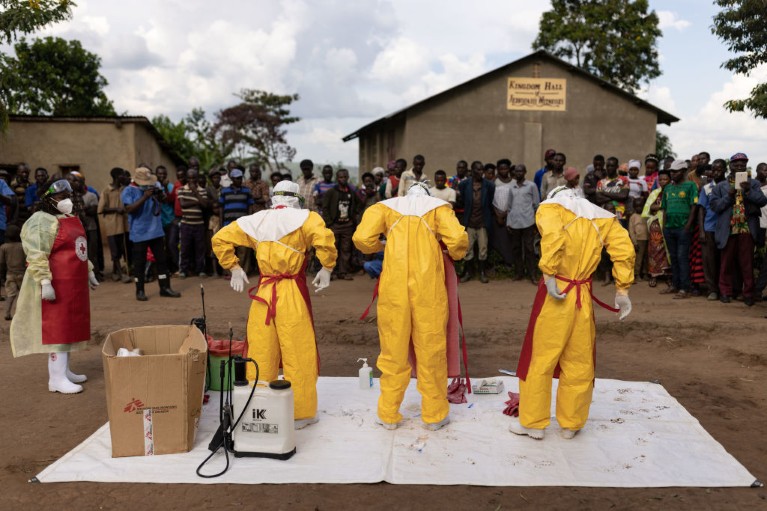
Uganda Battles Seventh Ebola Outbreak since 2000: Red Cross workers don Personal Personal Protective Equipment (PPE) prior to burying a 3-year-old boy suspected of dying from Ebola on October 13, 2022 in Mubende, Uganda. Emergency response teams, isolation centres and treatment tents have been set up by the Ugandan health authorities around the central Mubende district.Cedit: Luke Dray/Getty Images
Clinical trials conducted during Ebola outbreaks in Africa have been crucial in expanding the capacity to combat the disease. The latest Ebola outbreak in Uganda is expected to further improve knowledge on the disease, including testing new tools and vaccines.
On September 20, health authorities in Uganda declared an outbreak of Ebola virus disease (EVD). Several advances have been made regarding vaccines against Ebola. In October 2021, Nature Africa reported the Ad26.ZEBOV and MVA-BN-Filo Ebola vaccine regimens were safe, well tolerated and produced strong immune responses in children and adults. In November 2019, the WHO prequalified the injectable Ebola vaccine, Ervebo, paving the way for its use in high-risk countries.
Since then, Ervebo has been used for ring vaccination exercises in a number of African countries where Ebola Zaire virus outbreaks, occurred. This vaccine, however, is not effective in the current outbreak in Uganda, which is caused by the Ebola Sudan Virus (species Sudan ebolavirus).
Integrating research into Africa’s Ebola response
For about 30 years, work on the development of filovirus vaccines has advanced with the emergence of different platforms and types of vaccines, in addition to several preclinical studies. The problem, however, is the few outbreaks and the fewer number of infected individuals with the Ebola Sudan Virus in comparison with the Zaire virus.
“But I think there is a very strong foundation since everything we’ve learned from the West African (Ebola) epidemic is also going to help foster the development of vaccines for Sudan,” Cesar Munoz-Fontela, Group Leader at the German Center for Infection Research, told Nature Africa.
Clinical trial plans for Uganda
An approach that has been successfully implemented in Sierra Leone, Liberia, Sudan and other countries now allows the implementation of clinical trials quickly (within weeks) as part of the response to an outbreak says Ana Maria Henao-Restrepo, Implementation Research and Economic Analysis , Initiative for Vaccine Research , World Health Organisation. “We are talking directly with the developers who are also sharing all the vaccines information very quickly. The choice of a candidate vaccine to deploy in the current outbreak will be determined by which one has sufficient data to move on , we also ensure they have sufficient doses of othe clinical grade material available for the study to start.”
There is also the preparatory phase in the country. There is already a core protocol that includes all the critical elements to conduct a robust evaluation of a candidate vaccine based on experience with the Ebola virus. “We have that ready and it only needs to be adjusted to the Ugandan situation with the inputs of Ugandan researchers and with the approval of the national regulatory authority in Uganda. We already have the vaccine supplies ready to be deployed in trials,” Henao-Restrepo says. “These elements are all ready for the triggering of a clinical trial within a few weeks while still ensuring we are adhering to international and national standards. We are not cutting corners.”
